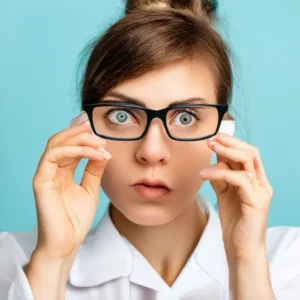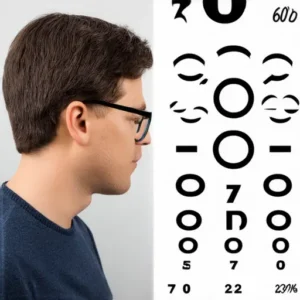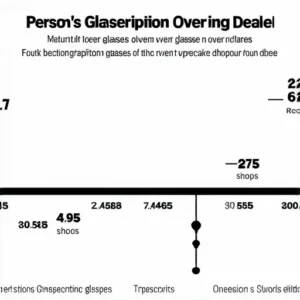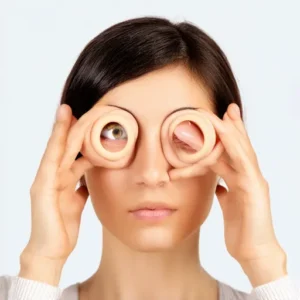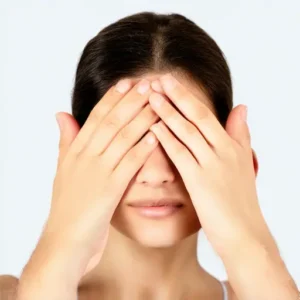Nearsightedness Suddenly Improved: What You Need to Know
Nearsightedness Suddenly Got Better? Here’s What’s Really Going On
Ever had that weird moment when your blurry distance vision seems to clear up out of nowhere? If you’ve noticed your nearsightedness (myopia) improving suddenly, you’re probably equal parts thrilled and confused. While myopia usually gets worse over time—especially in kids and teens—some people do experience temporary or even lasting improvements. But what causes this? Is it a good sign? And when should you worry? Let’s break it all down.
Why Would Nearsightedness Improve Suddenly?
Myopia 101: The Basics
Nearsightedness happens when your eyeball is a bit too long or your cornea too curved, making faraway objects look fuzzy while close-up stuff stays sharp. It typically starts in childhood and levels off in your 20s—but sometimes, it throws you a curveball.
Can Your Eyesight Actually Fix Itself?
Complete reversal? Rare. But temporary improvements? They happen. Maybe it’s your eyes changing, lifestyle tweaks paying off, or even an underlying health thing. (Though sudden changes always deserve a pro’s opinion—more on that later.)
Top Reasons Your Vision Might Seem Better
- Getting older has perks: After 40, presbyopia (that annoying need for reading glasses) can accidentally make your distance vision appear sharper.
- Screen breaks work: Cutting back on marathon Netflix sessions? Your strained eyes might thank you with temporarily clearer vision.
- Medication side effects: Some allergy or blood pressure meds can tweak your vision like a weird camera filter.
- Health changes: Conditions like diabetes or early cataracts can shift how you see things—literally.
When “Better” Vision Might Signal Something Else
Your Eyes Are Shape-Shifters (Sort Of)
Pregnancy, aging, or even a slightly swollen cornea can temporarily alter your eye’s shape—giving you a bonus round of clear vision before things settle back.
The Diabetes Connection
Here’s a plot twist: High blood sugar can plump up your eye’s lens, worsening near vision but improving distance clarity. It’s like your eyes are pranking you—definitely worth checking with your doctor.
Prescription Side Effects
That new allergy med might be drying your eyes or changing fluid balance, leading to short-term vision shifts. Always mention vision changes to your doc when starting medications.
Lifestyle Factors That Can Trick You Into Thinking Your Vision Improved
The 20-20-20 Rule Actually Works
Looking away from screens every 20 minutes? You might notice less eye strain and temporarily clearer vision. (Your eyeballs weren’t meant to stare at pixels all day.)
You Are What You Eat (Even for Eyes)
Loading up on leafy greens and omega-3s won’t cure myopia, but a nutrient-packed diet keeps your peepers functioning at their best.
Why Kids Need More Playtime Outside
Sunlight exposure may slow myopia progression in children. It’s not a cure, but it’s a great reason to kick them out of the house (for their own good).
Is This Improvement Forever or Just a Fluke?
When It Sticks (Rare But Possible)
LASIK surgery or age-related lens changes can lead to permanent improvement. But most spontaneous “miracle” vision changes? Temporary.
Common Causes of Temporary Clarity
Dehydration, exhaustion, or minor corneal changes can make your prescription seem lighter—until your body bounces back.
How to Play Detective With Your Vision
Keep a simple log: “Tuesday—vision clearer, but started new blood pressure meds Monday.” This helps your eye doc connect the dots.
Red Flags: When to Call the Eye Doctor STAT
Emergency Symptoms
- Vision changes plus pounding headaches or eye pain
- Seeing sudden floaters or light flashes
- Double vision or tunnel vision
What Happens During the Exam
Expect the usual “better one or two?” tests plus possible retinal scans or corneal mapping to rule out sneaky conditions.
Tests That Explain the Unexplained
Your doctor might check for cataracts, diabetes-related changes, or other vision influencers hiding in plain sight.
Busted: Myths About Fixing Nearsightedness
“Eye Yoga Cures Myopia” – Nope.
Reality check: While eye exercises reduce strain, they can’t reshape your eyeball. Don’t cancel your optometrist appointment.
Do Glasses Make Your Eyes Lazy?
Another myth. Properly prescribed lenses don’t weaken eyes—they’re like wheelchairs for your vision: helpful tools, not crutches.
How to Keep Your Vision From Backsliding
Pro Tips to Slow Myopia
- Follow the 20-20-20 rule like it’s your job
- Get kids outside 1-2 hours daily (the ultimate “screen time” hack)
- Read with proper lighting—no more under-covers flashlight sessions
Why Annual Eye Exams Matter
They catch vision shifts early, whether it’s time for new glasses or spotting health issues masquerading as vision changes.
Everyday Eye Protection
Wear sunglasses (UV protection isn’t optional), consider blue light filters for screens, and drink water like your corneas depend on it (they do).
The Bottom Line
What to Do If Your Vision Improves Unexpectedly
- Don’t assume it’s a miracle—track changes and context
- Schedule an eye exam (better safe than sorry)
- Keep up healthy habits—your future self will thank you
Final Thought: Stay Curious, Not Complacent
Sudden vision improvements can feel like winning the eyeball lottery, but they’re your body’s way of waving a tiny flag. Whether it’s harmless or a heads-up, your eye doctor is the ultimate decoder. Had a weird vision shift? Drop your story in the comments—we’re all ears (and eyes)!
Nearsightedness Improves With Age: What Science Says
Can Nearsightedness Actually Get Better With Age?
If you’ve been nearsighted since childhood, you might wonder: could my vision actually improve as I get older? It’s a question that gives hope to anyone tired of squinting at street signs or constantly reaching for their glasses. Let’s dive into what really happens to myopia as we age—separating hopeful possibilities from hard facts.
Myopia 101: Why Faraway Things Look Fuzzy
Nearsightedness isn’t just about blurry road signs or struggling to recognize faces across a room. It happens when your eyeball grows slightly too long or your cornea gets extra curved, making light focus just short of your retina. While most people’s myopia stabilizes by their 20s or 30s, our eyes keep changing throughout life in surprising ways.
The Aging Eye: More Than Just Reading Glasses
We all know about needing reading glasses after 40 (thanks, presbyopia!), but aging affects our eyes in multiple ways. Some lucky folks notice their distance vision sharpening over time—but is this wishful thinking or science-backed reality? Let’s look at what researchers have discovered.
What Science Says About Myopia and Aging
Turns out, there’s some good news for the nearsighted crowd. While not everyone gets a free vision upgrade, studies show interesting patterns:
- Most people hit pause: For many, myopia stops progressing in early adulthood
- Some get a bonus: About 20% of people experience slight improvement
- Nature’s trade-off: Presbyopia can make your myopia seem less severe when doing close-up work
Why Your Eyes Might Give You a Break
As we age, several natural changes can work in our favor:
- Your cornea might flatten just enough to help focus light better
- The lens becomes less flexible (causing presbyopia) but may compensate for myopia
- Changes in your eye’s gel-like interior can sometimes improve light bending
Busting Common Myopia Myths
Let’s clear up some persistent vision misconceptions:
- “Myopia always worsens with age.” Nope—many people stabilize or even improve slightly.
- “Needing readers means my nearsightedness is gone.” Actually, you can have both simultaneously.
- “Only LASIK can fix my vision.” Your eyes might make natural adjustments too.
How to Tell If Your Vision Is Improving
Wondering if you’re one of the lucky ones? Watch for these clues:
- Your glasses feel too strong for distance
- You’re squinting less at road signs or movie screens
- Night driving becomes slightly easier
Important note: Sudden vision changes always warrant an eye doctor visit—they could signal cataracts or other conditions masquerading as improved myopia.
The Flip Side: New Challenges That Come With Change
Even if your distance vision improves, aging eyes bring new considerations:
- You might need progressive lenses to handle both near and far vision
- Frequent prescription updates may be necessary
- Underlying conditions need to be ruled out
Keeping Your Eyes Healthy for the Long Haul
Want to give your vision its best shot at aging well? Try these tips:
- Load up on leafy greens, fish, and colorful fruits for eye-friendly nutrients
- Never skip your annual eye exam—they catch problems early
- Protect your peepers from UV rays and excessive screen glare
When Nature Needs a Helping Hand
If your myopia isn’t improving naturally, modern options can help:
- LASIK and other vision correction surgeries
- Special overnight contact lenses that reshape your cornea
- Updated prescriptions tailored to your changing vision
The Bottom Line
While not guaranteed, many people do experience some myopia improvement with age—whether from natural eye changes, presbyopia’s balancing effect, or other factors. The key is staying attentive to your vision changes and maintaining regular check-ups with your eye doctor. After all, your eyes are with you for life—it pays to take good care of them!
Have you noticed changes in your nearsightedness as you’ve gotten older? We’d love to hear about your experience in the comments!
Nearsighted Vision Improves With Age: 5 Facts You Should Know
Does Nearsightedness Get Better With Age? The Surprising Truth
If you’ve spent most of your life squinting at street signs or feeling lost without your glasses, you might be wondering: could my nearsightedness actually improve as I get older? The answer might surprise you. While your eyes don’t exactly “heal” from myopia, many people do experience noticeable changes in their vision as they age. Let’s dive into why this happens and what it means for your eye health.
Myopia 101: Why Faraway Things Look Fuzzy
Nearsightedness isn’t just about weak eyes – it’s actually a physical change in your eye’s shape. When your eyeball grows too long or your cornea gets too steep, light rays focus in front of your retina instead of directly on it. That’s why the restaurant menu in your hands looks crisp, but the sign across the street is just a colorful blur.
The Aging Eye: Nature’s Unexpected Trade-off
Here’s where things get interesting. Around age 40, most of us start developing presbyopia – that frustrating condition where you suddenly need reading glasses. But if you’re nearsighted, there’s a silver lining. As your eye’s lens hardens with age (causing presbyopia), it can actually compensate for some of your myopia. Suddenly, you might find you can read your phone without glasses, even though you still need them to drive.
Why This Matters for Your Eye Health
Understanding these changes helps you make smarter choices about your vision care. Instead of wondering if your eyes are playing tricks on you, you’ll know what’s normal and when it’s time to see your eye doctor about these shifts.
The Science Behind Age-Related Vision Changes
It might seem strange that aging – which we usually associate with vision getting worse – could actually help nearsighted people in some ways. But research backs this up.
Your Eyes’ Natural Balancing Act
Think of it like this: presbyopia and myopia are like two sides of a seesaw. As presbyopia increases with age, it can partially “cancel out” your nearsightedness for close-up tasks. That -3.00 prescription that had you dependent on glasses? It might not feel as strong when reading a book, though you’ll still need help seeing that exit sign down the hallway.
What the Research Shows
Studies have found that about 1 in 5 adults over 60 experience measurable decreases in their myopia. Some researchers believe subtle changes in our eyes’ shape and structure might contribute to this shift. But remember – everyone’s eyes age differently.
Busting Myths About Aging and Nearsightedness
Let’s clear up some common misunderstandings about vision and aging.
“My Vision’s Getting Better – I Can Toss My Glasses!”
Not so fast. While you might need your glasses less for certain tasks, most people don’t outgrow them completely. You might just graduate from single-vision lenses to progressives instead.
“If My Nearsightedness Improves, My Eyes Are Healthy”
Vision changes can sometimes signal other eye conditions. That’s why regular check-ups are crucial – what feels like improving myopia could actually be early cataracts changing your prescription.
What Determines If Your Vision Will Change?
Wondering if you’ll be one of the lucky ones? These factors play a role:
- Your genes: Like most things, family history matters
- Your daily habits: Heavy screen users might notice different changes
- Overall eye health: Conditions like diabetes can affect these changes
Signs Your Nearsightedness Might Be Shifting
How can you tell if your eyes are making these natural adjustments? Watch for:
- Suddenly being able to read texts without your glasses (even if the TV is still fuzzy)
- Your eye doctor prescribing weaker lenses during exams
- Fewer headaches after reading or computer work
Pro tip: Any sudden vision change deserves a doctor’s visit – better safe than sorry!
Living With Changing Vision
Adapting to these shifts doesn’t have to be frustrating. Try these strategies:
- Embrace the check-up: Annual eye exams catch changes early
- Upgrade your specs: Progressive lenses might become your new best friend
- Baby those eyes: More breaks from screens, more leafy greens, and always sunglasses outside
The Bottom Line
While aging brings its share of challenges, many nearsighted people find some unexpected vision perks along the way. The key is staying informed, getting regular check-ups, and being open to adjusting your vision care as needed. After all, our eyes are always telling us new stories – we just need to learn how to listen.
Remember:
- Presbyopia can help balance out nearsightedness for close work
- Changes happen gradually and differently for everyone
- Your eye doctor is your partner in navigating these shifts
Have you noticed your nearsightedness changing as you’ve gotten older? We’d love to hear about your experience in the comments!
Natural Ways to Improve Your Eyesight – Start Today!
Natural Ways to Improve Your Eyesight – Start Today!
Introduction: Why Your Eyes Deserve Some TLC
Let’s face it – between endless Zoom calls, binge-watching our favorite shows, and scrolling through social media, our eyes are working overtime these days. While glasses and contacts can help, wouldn’t it be great to actually improve your vision naturally? The good news is that with some simple tweaks to your daily routine, what you eat, and how you care for your eyes, you can make a real difference in your eye health.
Our Screen-Filled World and Eye Health
Did you know the WHO estimates over 2.2 billion people worldwide struggle with vision problems? Between digital screens, processed foods, and environmental pollutants, it’s no wonder our eyes are crying out for help (sometimes literally!). But here’s the silver lining – many common vision issues respond really well to natural approaches.
Small Changes, Big Impact
Here’s something eye-opening (pun intended!) – little things like adding more greens to your plate or taking regular screen breaks can add up to major benefits for your vision over time. It’s all about working with your body’s natural healing abilities.
Why Go Natural?
While glasses and surgery can correct vision temporarily, natural eye care methods focus on strengthening your eyes from the inside out. Think of it like exercise for your peepers – building long-term health without side effects.
Eye Health 101: Understanding Your Vision
Before we dive into solutions, let’s quickly cover how your amazing eyes actually work.
How Your Eyes Work (And Why They Sometimes Don’t)
Your eyes are like tiny, super-complex cameras with muscles that need to stay flexible and nerves that require good circulation. When we strain them too much (hello, 10-hour workdays!) or don’t feed them right, that’s when problems like nearsightedness or eye fatigue creep in.
What’s Messing With Your Vision?
- Getting Older: Just like the rest of us, eyes show signs of aging – usually starting with trouble reading small print.
- Screen Overload: That blue light from devices isn’t doing your eyes any favors.
- Diet Gaps: Missing key nutrients? Your eyes feel it first.
Why Natural Methods Work
Instead of just correcting symptoms, natural approaches get to the root of vision problems – whether that’s poor circulation, tired eye muscles, or nutritional deficiencies.
Eat Your Way to Better Vision
You really are what you eat – especially when it comes to your eyes! Here’s what should be on your plate.
Vision Superfoods
- Vitamin A Heroes: Carrots and sweet potatoes for night vision (no, that’s not just an old wives’ tale!)
- Vitamin C Boosters: Citrus and bell peppers to help prevent cataracts
- Vitamin E Sources: Nuts and seeds to combat oxidative stress
- Zinc-Rich Foods: Beans and seafood to keep your retina happy
Top Foods for Your Eyes
- Leafy Greens: Spinach and kale are packed with vision-protecting lutein
- Carrots: The original eye food, loaded with beta-carotene
- Fatty Fish: Salmon and tuna deliver those all-important omega-3s
Don’t Forget to Drink Up!
Dehydrated? Your eyes will be among the first to protest with dryness and blurry vision. Keep that water bottle handy!
Eye Yoga: Exercises for Stronger Vision
Just like going to the gym keeps your body fit, these simple exercises can keep your eye muscles in shape.
Quick Eye Workouts
- Eye Rolling: Give your eyes a gentle stretch by rolling them in circles
- Near-Far Focus: Alternate between looking at something close and far away to improve flexibility
The Golden Rule: 20-20-20
Every 20 minutes, give your eyes a 20-second break by looking at something 20 feet away. Your eyes will thank you!
Instant Relaxation Techniques
Try palming – just cover your closed eyes with your warm hands for a minute. It’s like a mini-spa treatment for your tired eyes!
Daily Habits for Healthier Eyes
Beyond what you eat and specific exercises, your everyday choices make a big difference.
Be Screen Smart
Use blue light filters and make a habit of looking away from screens regularly. Your eyes weren’t designed for non-stop digital marathons!
Set Up Your Space Right
Make sure your workspace lighting doesn’t cause glare and that your screen is at eye level. Small adjustments can prevent big strain.
Sleep – Nature’s Eye Repair Time
Ever notice how much better your eyes feel after a good night’s sleep? That’s when they do their best healing work. Aim for those 7-9 hours!
Nature’s Eye Helpers: Herbs and Supplements
Sometimes our eyes need a little extra support from Mother Nature’s medicine cabinet.
Herbal Vision Boosters
- Bilberry: Great for night vision (pilots used it during WWII!)
- Ginkgo Biloba: Gets more blood flowing to your eyes
Supplement Smarts
Omega-3s from fish oil can be a game-changer for dry eyes – just check with your doctor first if you’re on medications.
Clear Eyes, Calm Mind
Did you know stress can literally make your vision blurry? Here’s how to relax your way to better eyesight.
Stress and Your Sight
That annoying eye twitch when you’re stressed isn’t just annoying – it’s a sign your eyes need you to chill out!
Breathe Your Way to Better Vision
A few minutes of deep breathing can work wonders for tense eye muscles. Try it next time your eyes feel tired.
Wrapping Up: Your Action Plan for Better Vision
Improving your eyesight naturally isn’t about quick fixes – it’s about creating eye-healthy habits that last a lifetime.
Quick Recap
- Feed your eyes with nutrient-packed foods
- Give your eye muscles regular workouts
- Be mindful of screen time and lighting
- Hydrate well and sleep better
Your Next Steps
Why not pick one tip to start with today? Your future self (with healthier eyes!) will thank you. Got your own eye care secrets? Share them in the comments below – let’s learn from each other!
Can You Really Improve Vision? Natural Ways to Increase Eyesight
Can You Actually Improve Your Vision Naturally? Let’s Find Out
Ever wished you could ditch the glasses or contacts and boost your eyesight the natural way? You’re not alone. While many assume fading vision is inevitable, research shows that simple lifestyle tweaks—like eating the right foods and doing eye exercises—can help maintain and even sharpen your sight.
In this guide, we’ll dive into science-backed ways to support your vision, from nutrient-packed superfoods to easy daily habits. Whether you’re nearsighted, glued to screens, or just want to keep your eyes healthy as you age, these tips can make a real difference—no surgery required.
How Vision Works (And Why It Sometimes Doesn’t)
Most vision issues—like nearsightedness, farsightedness, or astigmatism—happen when light doesn’t focus correctly on your retina. Then there’s age-related stuff, like struggling to read menus (thanks, presbyopia) or cloudy vision from cataracts. Genetics play a role, but let’s be honest: binge-watching shows in the dark and surviving on takeout probably aren’t helping.
Here’s Why Natural Vision Improvement Isn’t Just Hype
Turns out, nutrients like lutein act like sunscreen for your retinas, while eye exercises work like a gym session for your ocular muscles. These methods won’t fix severe conditions overnight, but they can slow decline and keep your peepers healthier longer.
Why Go Natural?
Glasses and contacts are great bandaids, but they don’t solve the root issues—like eye strain from scrolling or missing nutrients in your diet. Natural approaches are gentler, cheaper, and often come with bonus perks (hello, better skin from all those antioxidants).
Eat Your Way to Better Vision
You really are what you eat—especially when it comes to your eyes. These foods are like fuel for your vision:
Vision Superfoods You Should Try
- Leafy greens: Spinach and kale are packed with lutein, nature’s blue-light blocker.
- Carrots: Yes, the old wives’ tale got this one right—beta-carotene helps with night vision.
- Fatty fish: Salmon’s omega-3s are like moisture therapy for dry eyes.
- Eggs: The yolks contain nutrients that help maintain your eye’s natural lens.
- Berries: Blueberries aren’t just delicious—they boost blood flow to your retinas.
Must-Have Vitamins for Healthy Eyes
Think of these as your eye health multivitamin:
- Vitamin A: Keeps night blindness at bay (find it in sweet potatoes and eggs).
- Vitamin C: Helps prevent cataracts (oranges and bell peppers are loaded).
- Vitamin E: Protects your eye cells (snack on almonds and sunflower seeds).
- Zinc: Essential for retina health (oysters are the MVP here).
Don’t Forget to Hydrate
Dehydrated body = dehydrated eyes. Aim for eight glasses of water daily, and maybe ease up on that third coffee—caffeine can dry you out.
Eye Exercises: Personal Training for Your Peepers
Your eye muscles need workouts too! Try these simple moves:
Easy Eye Workouts Anyone Can Do
- Near-and-far focusing: Alternate between looking at your pen and something across the room.
- Figure eights: Trace imaginary eights with your eyes to improve flexibility.
- Eye rolls: Circle your eyes clockwise, then counterclockwise to relieve tension.
The 20-20-20 Rule (Your Eyes’ Best Friend)
Every 20 minutes on screens, look at something 20 feet away for 20 seconds. Your strained eyes will thank you.
Palming: Instant Eye Relaxation
Rub your hands warm, then cup them over closed eyes for a minute. It’s like a mini spa treatment for your overworked eyes.
Lifestyle Tweaks for Healthier Vision
Small daily changes can make a big difference for your eye health.
Screens: The Modern Eye Strain Epidemic
All that scrolling leads to dry, tired eyes. Try blue light filters and—please—give your phone a rest before bed.
Set Up Your Space for Eye Comfort
Position screens at eye level and use soft lighting. No more squinting at your laptop in a dark room!
Sleep: When Your Eyes Repair Themselves
Skimping on sleep? That’s why your eyes are red and puffy. Aim for 7-9 hours to let them recharge properly.
Herbs and Supplements Worth Considering
Some natural boosters can give your vision extra support.
Herbs That Help Your Eyes
- Ginkgo biloba: Gets more blood flowing to your retinas.
- Eyebright: Yes, that’s really its name—it helps with eye fatigue.
- Bilberry: Strengthens tiny blood vessels in your eyes.
Do Omega-3s and Antioxidants Help?
Fish oil fights dry eye, while antioxidants protect against age-related decline. Just don’t expect miracles from a pill alone.
A Quick Safety Note
Check with your doctor before trying supplements, especially if you take medications. More isn’t always better—some vitamins can build up to toxic levels.
Protecting Your Eyes From Everyday Damage
Your eyes face more threats than you might realize.
Sunglasses Aren’t Just a Fashion Statement
UV rays accelerate cataracts and macular degeneration. Wear shades that block 100% of UV rays—your future self will be grateful.
Blue Light: The Sneaky Culprit
That late-night scrolling session? The blue light messes with your sleep and strains your eyes. Try blue light glasses or night mode settings.
Don’t Underestimate Air Quality
Dry, polluted air irritates eyes. A humidifier adds moisture, while air purifiers reduce allergens that cause redness.
Vision Myths: Busted
Let’s separate fact from fiction when it comes to eye health.
Carrots: Helpful But Not Magical
They’re great for vitamin A, but eating a bushel won’t give you eagle vision. Balance is key.
Do Eye Massages Actually Help?
They feel amazing and relieve tension, but they won’t fix your prescription. Sorry!
Are Pricey Supplements Worth It?
Some help, but you’re often better off eating whole foods. If you do buy supplements, look for reputable brands.
Your Action Plan for Better Vision
Consistency is everything. Start small—maybe add some spinach to your meals or try the 20-20-20 rule today.
Quick Tips to Remember
- Load up on colorful fruits and veggies
- Give your eyes screen breaks
- Wear those sunglasses
- Sleep well and stay hydrated
The Bottom Line
While natural methods can’t replace medical treatment for serious conditions, they’re powerful tools to keep your vision sharp. Pick one tip to try this week—your eyes will notice the difference!
Have you tried any natural vision boosters? We’d love to hear what worked for you in the comments!
How to Improve Vision Naturally—Backed by Science
Introduction: Why a Natural Approach to Better Vision Matters
Let’s face it—our eyes are working overtime these days. Between endless screen time, artificial lighting, and modern diets, it’s no wonder so many of us are reaching for glasses or squinting at our phones. But what if you could give your vision a natural boost? The good news is, science backs several simple, drug-free ways to maintain—and even improve—your eyesight. From eye-friendly foods to quick exercises, let’s explore how you can support your vision naturally.
Why Eye Health Should Be on Your Radar
Here’s an eye-opener: nearly 60% of adults experience digital eye strain, according to the American Optometric Association. Blurry vision, dry eyes, and that tired, gritty feeling aren’t just annoying—they’re your eyes crying out for help. The silver lining? Small daily habits can make a big difference in keeping your vision sharp.
What Research Tells Us About Natural Vision Care
Forget magic fixes—real science shows that targeted nutrition, simple exercises, and smart lifestyle tweaks can strengthen your eye muscles, protect your retina, and fight oxidative stress. Think of it as a workout and spa day for your eyes!
The Science Behind Natural Vision Improvement
Before we jump into solutions, let’s geek out on how your amazing eyes actually work—and what commonly goes wrong.
Eye Biology 101: How We See (and Why We Sometimes Don’t)
Your eyes are like high-tech cameras, with the cornea, lens, and retina working together to focus light. When vision problems pop up, it’s often due to:
- Lazy eye muscles (yes, your eyes have muscles that can get out of shape!)
- Free radical damage (those pesky molecules that age your eyes)
- Poor circulation (your eyes need good blood flow to stay healthy)
Proof That Natural Methods Work
Peer-reviewed studies don’t lie:
- Loading up on leafy greens can actually thicken your macular pigment (your eyes’ natural sunglasses)
- Simple eye exercises really can reduce strain and sharpen focus
- Something as basic as drinking enough water helps prevent dry eyes
Eat Your Way to Better Vision
Your mom was right—carrots are good for your eyes! But they’re not the only vision superheroes out there.
Go Green for Your Eyes
Spinach, kale, and their leafy friends pack lutein and zeaxanthin—nature’s blue light blockers. Research shows these nutrients can slash your risk of age-related vision problems. Who knew salad could be such an eye-saver?
Fish for Clear Sight
Salmon, sardines, and flaxseeds deliver omega-3s that keep your retina happy. They’re like moisturizer for your eyes from the inside out!
Color Your Plate for Eye Health
Orange veggies (carrots, sweet potatoes) boost night vision, while colorful berries fight eye aging. Pro tip: The more colorful your plate, the happier your eyes will be.
Eye Exercises That Actually Work
Your eye muscles need workouts too—here’s how to keep them in shape.
The 20-20-20 Rule (Your Eyes’ Best Friend)
Every 20 minutes, look 20 feet away for 20 seconds. It’s like a mini-vacation for your overworked eyes!
Two Quick Stress-Busters for Your Eyes
Palming: Warm your hands and cup them over closed eyes—instant relaxation. Focus shifting: Alternate between near and far objects to keep your focusing skills sharp.
Try Eye Yoga (Yes, It’s a Thing)
Slow eye rolls and tracing imaginary figure-eights might feel silly, but they’re great for coordination and reducing fatigue. Your eyes will thank you later.
Daily Habits for Healthier Eyes
Small changes can lead to big improvements in how you see the world.
Outsmart Blue Light
Use screen filters, take regular breaks, and maybe try blue light glasses—your retinas will appreciate the protection.
Set Up an Eye-Friendly Workspace
Good lighting + screen at eye level + proper distance = less squinting and straining. Your future self will be grateful.
Don’t Skimp on Sleep and Water
Puffy, dry eyes? Could be you’re not sleeping enough or drinking adequate water. Aim for 7-9 hours and keep that water bottle handy.
Natural Supplements: Helpful or Hype?
Some herbs and vitamins show promise, but let’s separate fact from fiction.
Bilberry and Ginkgo—Worth Trying?
Bilberry might sharpen night vision, while ginkgo could boost eye circulation. The research isn’t definitive, but they’re generally safe to try.
Key Nutrients in Pill Form
If your diet falls short, consider:
- Vitamin A (for retina health)
- Vitamins C & E (antioxidant armor)
- Zinc (vitamin A’s wingman)
Remember—supplements complement, don’t replace, a good diet.
Vision Myths Busted
Let’s clear up some common misconceptions about eye health.
Can You Actually Fix Bad Eyesight Naturally?
While you can’t completely undo conditions like nearsightedness, natural methods can slow progression and ease symptoms. Think management, not miracle cure.
Carrots and Exercises: The Truth
Myth: “Carrots alone give you eagle vision.” Reality: They help, but variety is key. Myth: “Eye exercises replace glasses.” Reality: They’re helpful, but not magic.
Wrapping Up: Your Vision Action Plan
The path to better vision naturally is about consistency, not quick fixes. By combining smart nutrition, simple exercises, and eye-friendly habits, you’re giving your eyes the best possible care.
Quick Recap: Start Today
- Load up on greens, colorful veggies, and omega-3s
- Practice the 20-20-20 rule and eye exercises
- Protect your eyes from screens and get quality sleep
Final Thought: Small Steps, Big Results
Like any health journey, vision improvement takes time. But with patience and consistency, you might be surprised by how much better your eyes can feel. Have you tried any natural vision tips? We’d love to hear what’s worked for you—drop your experiences in the comments!
Is Natural Healing of Eyesight Possible Without Glasses?
Can You Really Improve Your Eyesight Naturally—Without Glasses?
Let’s be honest: the idea of ditching your glasses or contacts and healing your vision naturally sounds like a dream. But is there any truth to it? The debate over natural eyesight improvement has been around for ages—some swear by it, while others brush it off as wishful thinking. So, what’s the real story? Whether you’re dealing with mild nearsightedness, digital eye strain, or just want to keep your vision sharp, let’s break down the facts, myths, and practical tips you can actually use.
What Does “Natural Eyesight Healing” Even Mean?
Think of it like training a muscle—your eyes can adapt and improve with the right care. Natural vision improvement focuses on techniques like eye exercises, better nutrition, and reducing eye strain. It’s not about miracle cures, but small, consistent habits that add up over time.
Myths vs. Facts: Let’s Clear Things Up
Before we go further, let’s bust some common myths:
- Myth: Wearing glasses makes your eyes weaker. Truth: Glasses correct your vision—they don’t weaken your eyes. But if you never give your eyes a break (like staring at screens all day), they might feel dependent on them.
- Myth: Eating carrots will give you perfect vision. Truth: Vitamin A is great for your eyes, but it’s not a magic bullet. A balanced diet and healthy habits matter way more.
- Myth: Eye exercises can fix serious conditions like cataracts. Truth: Natural methods might help with mild strain, but serious issues need medical attention.
The Science Behind Natural Vision Improvement
So, is there any real science backing this up? Let’s dig in.
How Your Eyes Work—And Can They Heal Themselves?
Your eye is like a camera—light hits the retina, which sends signals to your brain. Problems like nearsightedness happen when your eyeball’s shape or lens flexibility isn’t quite right. While your eyes can’t completely reshape themselves, research shows certain habits can reduce strain and improve focus.
What Studies Say
Here’s what science tells us:
- A 2012 study in Ophthalmology found that kids who spent more time outdoors had slower myopia progression.
- Techniques like the Bates Method (eye exercises) show mixed results—some people report less strain, but no major structural changes.
When Natural Methods Aren’t Enough
Let’s be real: natural healing won’t fix serious conditions like glaucoma or advanced cataracts. If you’re dealing with major vision issues, always see an eye doctor first.
Why Your Eyesight Might Be Struggling—And How to Help It
Understanding the root cause is half the battle. Here’s what might be affecting your vision—and how to tackle it naturally.
Digital Eye Strain: The Modern Vision Killer
Staring at screens all day? No wonder your eyes feel tired. Try these fixes:
- The 20-20-20 rule: Every 20 minutes, look at something 20 feet away for 20 seconds. (Your eyes will thank you.)
- Turn down screen brightness and use blue light filters.
Eat Your Way to Better Vision
Your diet plays a huge role. Focus on these nutrients:
- Vitamin A: Keeps your retina healthy (hello, carrots and spinach).
- Omega-3s: Fight dry eyes (found in salmon and flaxseeds).
- Lutein & Zeaxanthin: Protect against blue light (load up on kale and eggs).
Bad Habits That Wreck Your Vision
Smoking, skimping on sleep, and binge-scrolling? Not great for your eyes. Prioritize rest, hydration, and regular screen breaks.
Natural Vision Improvement: What Actually Works
Ready to give natural methods a shot? Here’s where to start.
Easy Eye Exercises to Try Today
- Palming: Rub your hands together to warm them, then gently cup them over your closed eyes. Feels amazing, right?
- Focus Shifting: Alternate between looking at something close and far away to flex those eye muscles.
Foods That Boost Eye Health
Add these to your grocery list:
- Leafy greens (spinach, kale).
- Bright-colored fruits (blueberries, oranges).
- Nuts and seeds (almonds, chia seeds).
Don’t Underestimate Sleep and Water
Dehydration = dry eyes. Poor sleep = tired, strained vision. Aim for 7-9 hours and drink plenty of water—it’s simple but effective.
Beyond the Basics: Alternative Therapies
Feeling adventurous? Some people swear by these holistic approaches.
Acupuncture and Acupressure for Eyesight
Some studies suggest it improves blood flow to the eyes, but results vary. Worth a try if you’re open to it!
Herbal Remedies: Do They Help?
Ayurvedic herbs like triphala and ginkgo biloba are traditional favorites—just check with a pro before diving in.
The Bates Method: Does It Hold Up?
This old-school technique focuses on relaxation and eye exercises. Some people report less strain, but it’s not a cure-all.
Real People, Real Results?
Curious if natural methods actually work for others? Here’s the scoop.
Success Stories (And Realistic Expectations)
There are plenty of anecdotes—like people reducing mild myopia with the Bates Method—but hard scientific evidence is limited. Results take time and consistency.
How Long Until You See Changes?
Don’t expect overnight miracles. Minor improvements might take weeks or months, depending on your habits and starting point.
The Fine Print: Risks and Realities
Natural healing isn’t risk-free. Here’s what to watch for.
When to See a Doctor
Severe vision problems? Don’t rely on natural fixes alone. Medical conditions need professional care.
The Big Danger of Skipping Eye Exams
Ignoring check-ups because you’re “trying natural methods first” can backfire. Always get regular eye exams.
The Bottom Line: Is Natural Eyesight Improvement Possible?
For mild issues—especially strain-related ones—yes, natural methods can help. But serious conditions need medical treatment. The best approach? Combine natural care with professional advice.
Quick Recap: What Helps and What Doesn’t
- Works: Eye exercises, good nutrition, hydration, and screen breaks.
- Doesn’t Work: Miracle cures or fixing serious conditions without medical help.
Final Advice: Balance Is Key
Listen to your eyes—and your eye doctor. Natural methods can support your vision, but they’re not a replacement for professional care. Ready to start? Pick one or two tips, stick with them, and see how your eyes feel. Who knows—you might notice a difference sooner than you think!
Avoid These 3 Mistakes That Harm Natural Eyesight
Your Eyes Deserve Better: Simple Ways to Protect Your Natural Vision
Let’s be honest – we all take our vision for granted… until something goes wrong. In our screen-filled world, our natural eyesight faces more threats than ever before. But here’s the good news: most eye problems aren’t inevitable. With the right knowledge, you can keep your vision sharp for years to come.
In this guide, we’ll walk through the three biggest vision mistakes people make (you’re probably guilty of at least one), and more importantly – how to fix them. Whether you’re glued to a computer all day or just want to maintain healthy eyes, these practical tips will help.
Why Your Eyes Need TLC (Before It’s Too Late)
Vision changes creep up slowly – like that friend who always shows up 10 minutes late until suddenly they’re an hour behind. Before you know it, you’re squinting at menus and blaming the “bad lighting.” The truth? Proactive care now can prevent bigger problems later.
Eye Myths That Are Actually Hurting Your Vision
Carrots will give you super-vision! Glasses make your eyes weaker! We’ve all heard these – but believing them might be damaging your eyes. We’ll bust these myths later, but first, let’s tackle the real daily threats to your natural eyesight.
Mistake #1: Your Screen Addiction Is Stressing Your Eyes
Be honest – how many hours today have you spent staring at screens? Our devices might make life easier, but they’re not doing our eyes any favors. The good news? Small changes can make a big difference.
That Annoying Blue Light? Here’s What It’s Really Doing
Your screens aren’t just keeping you from sleep with endless scrolling – that blue light is actually:
- Causing digital eye strain (hello, headaches and dry eyes)
- Messing with your sleep hormones
- Potentially increasing long-term risks to your retina
Your Eyes Are Screaming for Help (Are You Listening?)
Your body sends signals when your eyes are overworked. Watch for:
- That “just can’t focus” feeling by 3 PM
- Eyes that feel like they’ve been rubbed with sandpaper
- Suddenly thinking every light is too bright
- Neck pain from hunching toward your screen
Screen Time Survival Guide
You don’t need to quit your job and move to a cabin in the woods. Try these simple fixes:
- The 20-20-20 rule (your new best friend)
- That handy “night mode” setting on your phone? Actually use it
- Keep screens at arm’s length (no, your phone doesn’t belong 3 inches from your face)
- Blue light glasses – not just for tech bros
Mistake #2: You’re Starving Your Eyes (Nutrition Matters)
Your eyes are hungry – and no, that bag of chips isn’t what they’re craving. Just like the rest of your body, your eyes need specific nutrients to stay healthy.
Eye Superfoods You Should Be Eating
Want to eat your way to better vision? Load up on:
- Vitamin A: Sweet potatoes and spinach (sorry, carrots aren’t the only option)
- Lutein & Zeaxanthin: Kale and eggs – nature’s blue light blockers
- Omega-3s: Salmon and walnuts for dry eye relief
- Zinc: Nuts and beans for eye protection
The Worst Foods for Your Eyes (And What to Eat Instead)
These are basically eye kryptonite:
- Sugary snacks: That afternoon candy bar isn’t doing your retina any favors
- White bread/pasta: Might increase your risk of cataracts
- Fried foods: Delicious, but potentially harmful to your macula
Swap them for eye-friendly snacks like berries or a handful of almonds.
Don’t Forget to Drink Up
Dehydrated body = dehydrated eyes. If your eyes feel dry, try drinking more water before reaching for eye drops. Pro tip: for every coffee, drink an extra glass of water.
Mistake #3: Your Eyes Need a Workout Too
You exercise your body – why not your eyes? Just like any other muscle, they need movement and rest to stay strong.
The 20-20-20 Rule Explained
Every 20 minutes, look at something 20 feet away for 20 seconds. This simple trick:
- Gives your eye muscles a much-needed break
- Reduces that end-of-day blurry vision
- Reminds you to blink (yes, we forget to do this!)
Eye Exercises That Actually Work
Try these daily (check with your eye doctor first if you have conditions):
- Figure eights: Trace an imaginary ∞ with your eyes
- Near-far focusing: Alternate between your pen and something across the room
- Palming: Warm your hands and gently cup your closed eyes (bliss!)
Sleep – The Ultimate Eye Cream
Your eyes repair themselves while you sleep. Skimp on shut-eye and you might notice:
- Annoying eye twitches
- Red, bloodshot eyes
- More floaters than usual
Environmental Eye Enemies You Didn’t Know About
It’s not just screens – everyday environmental factors can damage your vision over time.
Sunglasses Aren’t Just a Fashion Statement
UV rays damage your eyes just like your skin. Look for sunglasses with:
- 100% UV protection (check the label!)
- Polarized lenses to cut glare
- Wrap-around styles for full coverage
Dry Air Is Your Eye’s Worst Nightmare
Offices and airplanes are eye deserts. Fight back with:
- A humidifier for your workspace
- Preservative-free artificial tears
- An air purifier if you’re in a polluted area
Simple Habits for Lifelong Healthy Vision
Small changes today can prevent big problems tomorrow.
Eye Exams Aren’t Optional
Even if your vision seems fine, get checked every 1-2 years. Many eye diseases show no symptoms until it’s too late.
Lighting Matters More Than You Think
Your workspace lighting could be straining your eyes. Aim for:
- Soft ambient light plus a task lamp
- No glare on your screens
- Natural light when possible
Eye Myths Busted
Let’s set the record straight on common vision misconceptions.
Do Glasses Actually Weaken Your Eyes?
Nope! Properly prescribed glasses correct vision without weakening your eyes. Not wearing needed glasses, however, can cause strain.
Can You Really Improve Your Vision Naturally?
While you can’t cure serious conditions with eye exercises, many people see improvement in mild vision issues by reducing strain and improving habits.
Your Action Plan for Healthier Eyes
Ready to take control of your eye health? Start with these simple steps:
Quick Tips You Can Start Today
- Set reminders for the 20-20-20 rule
- Add some leafy greens to your next meal
- Adjust your screen settings to reduce blue light
- Wear those sunglasses you keep forgetting about
- Get to bed 30 minutes earlier tonight
Your Eyes Will Thank You
Vision is precious – and often taken for granted until it’s compromised. By addressing these three common mistakes, you’re investing in clearer, more comfortable vision for years to come. Got your own eye care tip? We’d love to hear it in the comments!
Lifestyle Changes to Help Myopia Improve With Age
Can Myopia Actually Improve as You Age? Here’s What Really Helps
If you’re among the millions with myopia (nearsightedness), you’ve probably wondered: “Will my vision keep getting worse, or is there hope for improvement?” Here’s some good news—while myopia often stabilizes in adulthood, simple lifestyle tweaks can support your eye health and potentially slow its progression. In this guide, we’ll walk through practical, research-backed strategies that really can help myopia improve with age. Whether you’re a parent watching your child’s prescription creep up or an adult managing your own vision changes, these approaches make a noticeable difference.
Myopia 101: Why Your Eyes Change Over Time
Before we jump into solutions, let’s understand what’s actually happening in those peepers of yours.
The Science Behind Blurry Distance Vision
Myopia isn’t just about “weak eyes”—it happens when your eyeball grows slightly too long or your cornea gets extra curved. Instead of light focusing perfectly on your retina (like it should), it lands just in front, making distant objects look fuzzy. While genetics load the gun, lifestyle factors like marathon screen sessions and too little outdoor time often pull the trigger.
That Puzzling Midlife Vision Shift
Here’s something fascinating—many people notice their myopia stabilizing or even improving slightly in their 30s and 40s. Why? Because eye growth typically slows after adolescence. But don’t just wait around hoping for the best—proactive steps can support this natural process and prevent backsliding.
What Really Affects How Your Myopia Changes
- Family history: If your parents wore thick glasses, you might too
- When it started: Early-onset myopia often progresses faster
- Daily habits: How you use (and rest) your eyes matters more than you think
- Overall health: Good circulation and nutrition feed happy eyes
Eating Your Way to Better Vision
Your grocery list might be the most overlooked vision tool. Certain nutrients act like personal trainers for your eyes—strengthening tissues and potentially putting the brakes on myopia.
The Eye Health All-Star Team
These nutritional MVPs deserve a permanent spot on your plate:
- Vitamin A: Your cornea’s best friend (hello, sweet potatoes and carrots)
- Lutein & Zeaxanthin: Nature’s blue light blockers (load up on spinach and eggs)
- Omega-3s: The ultimate eye soothers (salmon and walnuts to the rescue)
- Vitamins C & E: Antioxidant bodyguards (citrus and almonds have your back)
Vision Superfoods Worth Trying
Next time you’re at the store, toss these in your cart:
- Colorful bell peppers (they’re like vitamin C grenades)
- Wild salmon (the omega-3 gold standard)
- Kale chips (yes, they can actually taste good)
- Blueberries (tiny but mighty antioxidants)
Don’t Forget to Water Your Eyes
Dehydration doesn’t just give you headaches—it can make your vision blurrier too. Shoot for 8-10 glasses of water daily, and maybe swap that third coffee for herbal tea. Pro tip: Snacking on cucumbers or watermelon counts toward your fluid intake!
Why Sunshine Might Be Your Eyes’ Best Medicine
Turns out that “go play outside” advice your parents gave was vision gold.
The Sunlight-Vision Connection
Natural light triggers dopamine release in your retina—nature’s way of keeping eyeball growth in check. Research shows kids who log 2+ hours outdoors daily slash their myopia risk. Adults benefit too—those lunchtime walks are doing more than just burning calories.
Fun Ways to Get Your Daily Light Fix
- Morning strolls (bonus: vitamin D boost)
- Tennis or pickleball (great for tracking moving objects)
- Gardening (the ultimate near-far vision workout)
- Cloud watching (seriously—it’s good for you)
The Screen Time Balancing Act
Try this easy rule: For every hour of close-up work (screens, books), spend 20 minutes looking at distant objects outdoors. Think of it as meal prep for your eyes—a balanced “visual diet” prevents strain and excessive eyeball stretching.
Eye Exercises That Aren’t Just Hocus Pocus
Your eye muscles need workouts too—these simple moves can improve focus and potentially slow myopia’s march.
Quick Eye Workouts Anyone Can Do
- Pencil Push-ups: Hold a pencil at arm’s length, slowly bring it toward your nose while keeping it single (when it doubles, you’ve gone too far)
- Figure Eights: Trace imaginary giant 8s with your eyes—great for smooth tracking
- Near-Far Tag: Alternate focus between your phone and something distant every 10 seconds
The 20-20-20 Rule That Actually Works
Every 20 minutes, look at something 20 feet away for 20 seconds. This simple habit prevents the eye strain that can worsen myopia. Set a phone reminder until it becomes second nature.
Why Consistency Beats Intensity
Like any workout regimen, regular practice strengthens those ciliary muscles controlling your lens shape. While not a magic cure, these exercises complement other myopia management strategies beautifully.
Surviving the Digital Age Without Wrecking Your Vision
Let’s face it—screens aren’t going anywhere. But smart habits can help your myopia improve with age despite our digital lives.
How Screens Mess With Your Eyes
Prolonged screen time causes:
- Eye muscle fatigue (like running a marathon with your eyelids)
- Blink droughts (leading to desert-dry eyes)
- Eyeball elongation (the myopia express no one wants to ride)
Screen Survival Tactics
- Keep devices at arm’s length (no nose-to-screen intimacy)
- Bump up text size (your eyes shouldn’t need to squint)
- Try matte screen protectors (glare is the enemy)
- Position monitors slightly below eye level (your neck will thank you too)
The Truth About Blue Light
While the science is still evolving, blue light filters (screen protectors or glasses) might reduce eye fatigue. But they’re no free pass—real relief comes from limiting screen time and taking proper breaks.
Why Skipping Eye Exams Is Like Flying Blind
Regular checkups are your secret weapon for keeping myopia in check.
How Often You Really Need to Go
- Kids: Yearly, or as your eye doc recommends
- Adults (18-60): Every two years, or annually if your prescription keeps changing
- 60+: Yearly to catch age-related changes early
Catching Changes Before They Catch You
Regular exams spot subtle prescription shifts, allowing for early interventions like specialized contacts or low-dose atropine drops that can slow progression.
Your Personal Eye Game Plan
A good optometrist will craft a customized strategy combining:
- Precision lenses (no “good enough” prescriptions)
- Ortho-k (overnight lenses that reshape while you sleep)
- Lifestyle tweaks tailored to your daily routine
Everyday Habits That Help Your Vision Thrive
Beyond specific interventions, overall wellness practices create the perfect environment for better vision.
Sleep—Your Eyes’ Reboot Button
During deep sleep, your eyes stock up on nutrients and repair daily wear. Aim for 7-9 quality hours, and consider a silk sleep mask if you wake up with dry eyes.
When Stress Messes With Your Vision
Chronic tension doesn’t just knot your shoulders—it can tighten eye muscles too. Try:
- Five-minute meditation sessions (even beginners benefit)
- Yoga poses that boost head circulation (downward dog, anyone?)
- Conscious breathing when your eyes feel fried
Party Habits That Don’t Play Nice With Eyes
Smoking shrinks blood vessels, starving your eyes of oxygen. Heavy drinking can lead to nutritional deficiencies affecting vision. Moderation keeps your peepers happier longer.
The Bottom Line
While genetics set the stage, your daily choices influence whether myopia improves with age. By combining smart nutrition, outdoor time, targeted exercises, screen savvy, and professional care, you give your eyes their best shot at stability and potential improvement.
Quick Recap:
- Embrace outdoor time (2+ hours daily does wonders)
- Practice the 20-20-20 rule religiously
- Feed your eyes their favorite nutrients
- Make eye exercises part of your routine
- Keep up with eye exams—no cheating!
Remember, managing myopia is more lifestyle marathon than quick sprint. Small, consistent changes add up to real results over time. Have you noticed your vision changing as you’ve gotten older? We’d love to hear what’s worked (or hasn’t) for you in the comments!
From Blurry to Clear: How My Eyesight Improved
From Blurry to Clear: My Personal Vision Transformation
Let me tell you about the years I spent living in a constant fog—squinting at my laptop, blinking furiously at street signs, and rubbing my tired eyes like there was no tomorrow. Then, something incredible happened. My eyesight actually improved, and no, it wasn’t magic. It was a series of simple, intentional changes that anyone can make. This is my real, honest journey from frustration to clarity, and why I’m sharing it with you today.
My Vision Comeback Story
I used to think worsening eyesight was just part of getting older—something I had to accept. But when I started understanding how eye health really works and made some lifestyle tweaks, everything changed. We’re talking small shifts in my daily habits that led to big improvements in how clearly I could see the world.
Why I’m Sharing This With You
Here’s the thing: millions of people struggle with vision problems, but most don’t realize they might have more control than they think. You don’t always need surgery or stronger glasses. If my experience can help even one person take charge of their eye health, sharing it will be worth it.
What’s Coming in This Post
I’ll walk you through my lowest points, my “aha” moment, and the exact steps that led to my vision improvement. Whether you’re dealing with minor eye strain or serious blurriness, these insights might just change how you see things—literally.
Life Before My Vision Improved
Before things got better, they were… not great. If any of this sounds familiar, keep reading—there’s hope ahead.
The Daily Struggle
- Screens were my nemesis: After just half an hour, text on my laptop would swim before my eyes.
- Night driving terrified me: Oncoming headlights looked like glowing orbs in a horror movie.
- Social situations got awkward: I’d miss subtle facial expressions in dim restaurants, making conversations harder than they needed to be.
How Poor Vision Was Holding Me Back
As someone who writes for a living, blurry vision wasn’t just annoying—it threatened my livelihood. Deadlines slipped as my eyes gave out. Even reading for pleasure felt like work. The frustration built up day after day.
The Emotional Impact
Beyond the physical strain, I felt like I was aging prematurely. Resigning myself to progressively thicker glasses felt like giving up. Then came the moment that changed everything.
The Wake-Up Call That Changed Everything
It took one too many pounding headaches to finally snap me out of complacency. Here’s what flipped the switch for me.
My Rock Bottom Moment
The turning point? Mistaking a coworker’s friendly wave for a cry for help across the office. That’s when I admitted: my vision problems were stealing joy from everyday life.
What the Eye Doctor Told Me
A comprehensive exam revealed two main issues: digital eye strain and mild astigmatism. But here’s what surprised me—the doctor said glasses weren’t my only option. There were actual steps I could take to improve my vision naturally.
The Real Reasons Behind My Vision Problems
Turns out, my issues came down to three key factors:
- My eyes were constantly dry because I wasn’t drinking enough water
- My eye muscles had gotten lazy from staring at screens all day
- My diet lacked crucial nutrients for eye health
The Lifestyle Changes That Made All the Difference
Improving my vision started with changing my daily habits. These were the absolute game-changers.
Eating for Better Vision
I started loading up on:
- Lutein & Zeaxanthin: Think spinach, kale, and eggs (nature’s blue light blockers)
- Omega-3s: Wild-caught salmon and chia seeds became my go-tos (bye-bye, dry eyes)
- Vitamin C: Bell peppers and citrus fruits (for stronger eye blood vessels)
Water and Sleep: The Unsung Heroes
Drinking three liters of water daily eliminated most of my eye strain. Pair that with 7-8 hours of quality sleep, and my eyes finally got the recovery time they needed.
Breaking Up With My Screen
I installed blue light filters, sure, but the real magic happened when I started taking “screen vacations” every 90 minutes. The difference was like night and day—literally.
Eye Exercises That Actually Work
Just like going to the gym strengthens your body, these exercises strengthened my eyes.
My 10-Minute Daily Eye Workout
Here’s the routine that changed everything:
- Pencil push-ups: Focus on a pencil tip as you bring it closer to your nose
- Figure eights: Trace imaginary infinity signs with your eyes
- Near-far shifting: Alternate focus between something close and something far away
The 20-20-20 Rule That Saved My Eyes
Every 20 minutes, I look at something 20 feet away for 20 seconds. This simple trick prevents that stiff, blurry feeling you get from staring at screens too long.
How Relaxation Improved My Vision
Here’s something I never considered—stress makes your eye muscles tense up. Simple techniques like palming (covering closed eyes with warm hands) and deep breathing made a noticeable difference.
Combining Professional Help With Natural Solutions
The best results came from using both medical advice and holistic approaches together.
Glasses vs. Vision Therapy
While glasses corrected my vision temporarily, they didn’t actually improve it. The eye exercises addressed the root causes instead of just masking symptoms.
Supplements That Supported My Eye Health
After doing my research, I added:
- Bilberry extract (great for night vision)
- Zinc (supports retinal health)
- Vitamin E (protects delicate eye cells)
Why Regular Eye Exams Matter
Going for check-ups twice a year helped catch small changes early. My optometrist became a partner in my vision improvement journey.
The Results: How Much My Vision Actually Improved
After three months of consistency, the changes were impossible to ignore.
My Before and After
- Eye chart: Went from struggling with the fourth line to easily reading the seventh
- Screen time: Could work for 5 hours straight without strain (up from just 2)
- Glasses: Cut my dependency by 60%
How Clearer Vision Changed My Life
From actually enjoying sunsets to spotting my dog across the park, the world came back into focus—and so did my confidence.
How I Maintain My Results
These days, I:
- Keep a simple “vision journal” to track what’s working
- Do quick monthly eye tests at home
- Never skip my annual eye exam
Wrapping Up
If my vision could improve this much, yours can too. It takes patience, but every small step adds up to clearer sight.
Your Action Plan for Better Vision
- Fix the basics first (hydration, nutrition, eye muscle strength)
- Make eye exercises part of your daily routine
- Work with eye care professionals who support your goals
Final Thoughts
Our eyes aren’t destined to get worse with time. With the right care and consistency, you might just find yourself seeing the world—quite literally—in a whole new way. Ready to start your own vision journey? Your clearer future could be closer than you think.
What’s been your biggest vision challenge? I’d love to hear about your experiences in the comments below!


